Technology
From a metal-strip to a seamless metal bellow
From a metal-strip to a seamless metal bellow
Metal bellows made by Mera Bellows are manufactured by a multistage plastic deformation process, starting with a metal strip. We receive high precision, thin-walled tubes as an intermediate product and at the request of our customers, we have included them in our product range.
Manufacturing Tubes
A multi-stage press cuts round plates out of a metal strip and forms them into small cups. These are cleaned and degreased using eco-friendly paraffin and later vacuum annealed. Following this, the cups are deep-drawn in several steps into thin-walled tubes. Concluding the processes, the tubes are once again cleaned and annealed using vacuum or inert-gas. This is the technique that Mera Bellows uses to manufacture high-precision tubes with closed ends. If requested, the ends can be cut in order to supply open tube constructions.
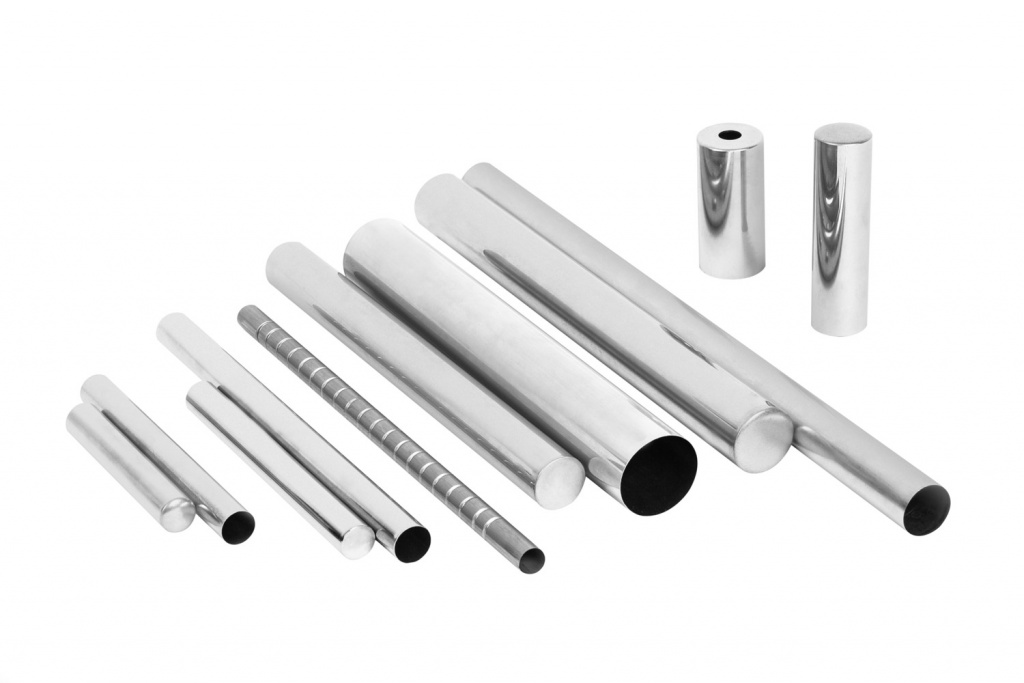
Producing Bellows
The hydroforming of a bellow is done inside of a purpose-built, very complex tool. To form the convolutions, water is pressed inside the tubes with a pressure of up to 250 bar. At the same time the tool is compressed. After hydroforming, the neck of the bellow is cut to the correct length, the shape of the bottom is formed, and the bellow gets its final length. Afterwards the metal bellows are cleaned once again and then stress-relieved under an inert-gas protection.
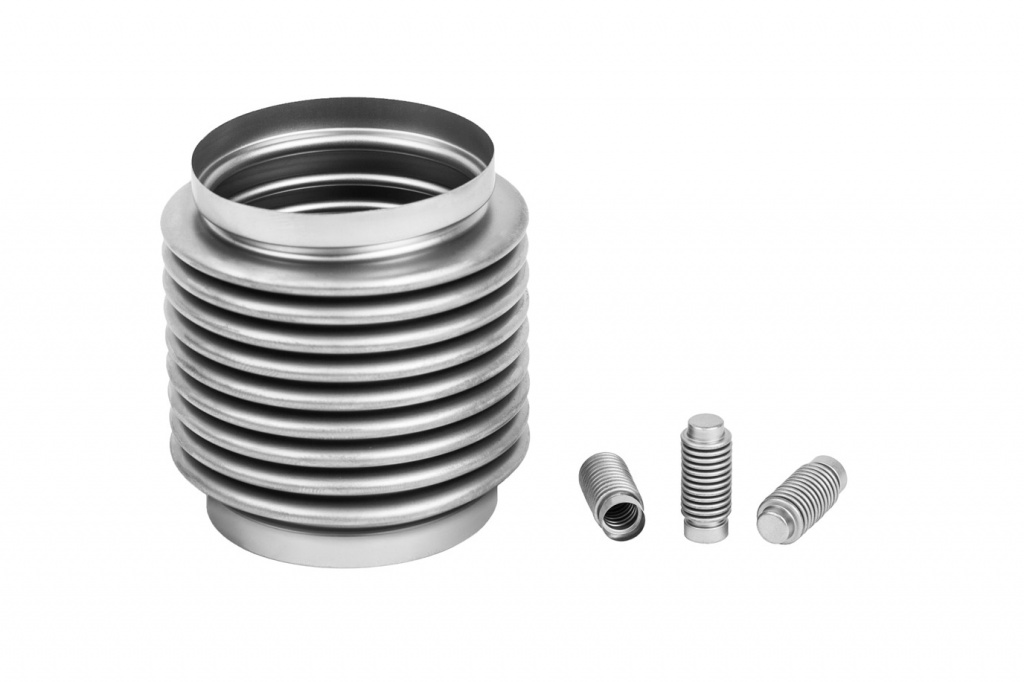
Manufacturing methods
Technology
Methodology
Deep Drawing
Depending on the size of either the tubes, or the production lot, Mera Bellows uses two versions of deep-drawing the tubes: comparatively small precision tubes in large production lots can be produced in a multi-stage deep-drawing technique using oil as a lubricant. The advantage of this process is the significant decrease in the number of cleaning and annealing steps but also requires usage of very expensive tools.
Smaller production lots or larger tubes are deep-drawn in a step-by-step methodology using soap as lubricant. Soap is water soluble, therefore it can be washed from the tubes in a comparatively simple way. In addition, soap is very eco-friendly. The tools can be made of regular and less expensive tooling-steel. Thus, the tooling costs are reduced.
Cleaning
At Mera Bellows oil is washed off the intermediate products by eco-friendly paraffin. After the cleaning process, the paraffin is vacuum-distilled and thus it can be used directly and with only a small loss for the next washing process. Soap is removed by using a new washing automat. The recycled water is constantly taken off the basin, cleaned by vacuum distillation and later recirculated to the washing process. The concentration of the detergent remains at optimal levels automatically.
Annealing
Due to the plastic deformation of the metal, it becomes very hard, so it has to be annealed before continuing the process. To do this, Mera Bellows uses vacuum-furnaces, that work at pressures between 10-2 to 10-4 mbar. The depression protects the surface of our products against oxidation. As an alternative solution. Mera Bellows uses inert-gas furnaces. To avoid oxidation, the products are annealed in a protective-gas atmosphere.
Hydroforming
To form the convolutions of the bellows, tubes are placed into a very special tool – called a cassette – which is produced individually for every type of bellow. Depending on the size of the bellows and the wall-thickness, water pressure of up to 250 bar is pressed inside of the tubes. The cassette is then compressed axially to the tube and subsequently the corrugations are formed.
Thermal Stress Relieving
Before the final quality control, one last working-step has to be completed – the thermal stress relieving. The bellows are heated under protective atmosphere and afterwards cooled down very slowly to room temperature.
Basic materials
Technology
Materials used by Mera Bellows
It is very important to choose the correct material for your metal bellows.
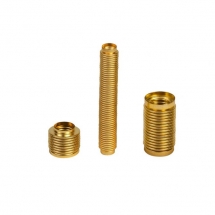
Non-ferrous metals
Bellows made of brass (e.g. CuZn20) or bronze (e.g. CuSn6) are often requested by companies operating in the measuring and control technology, using passive, non-aggressive mediums. Applications include temperature sensing – (for example the thermostatic head at radiators) and pressure sensing devices.
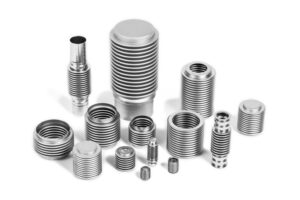
Stainless Steel
Precision bellows of stainless steel have outstanding tensile strength and corrosion resistance. They withstand high working pressures, temperatures or aggressive chemicals. Hydroformed stainless steel bellows are furthermore suitable for usage in vacuum or ultra-high vacuum. Examples are sealing solutions for vacuum valves, − pumps, or vacuum interrupters (medium-voltage circuit breakers). Those production lines place a high emphasis on cleanliness, particularly with regard to an unexceptionable weldability. The supply of seamless bellows, continuous improvement of our washing technologies- and rigorous quality control, help to meet these requirements, also for the semiconductor industry.
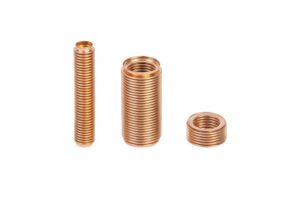
Beryllium-Copper
is an alloy of copper with 0.4-2% beryllium. Bellows of beryllium-copper have a high electric conductivity, whilst achieving the required non-magnetic signature. Beryllium copper bellows can be applied in a wide range of temperatures. Due to their outstanding elasticity they react on the smallest changes, e.g. in terms of their surrounding pressure. They are widely used in electrical engineering, activation/alarm systems and many other industries where mechanical pressure sensor bellows are needed (bellows pressure gauges).
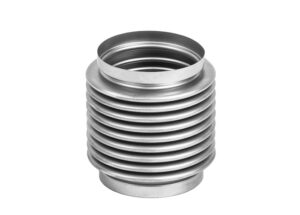
Monel
is a nickel-copper alloy with enormous resistance towards different acid and alkaline solutions. That is why bellows of monel are often requested for fluid handling of aggressive chemicals. Soldering of monel bellows is relatively simple.
For requests of other materials we try to develop customized solutions.
 Common materials
Common materials
| Name | DIN | AISI |
|---|---|---|
| Stainless steel | ||
| X6CrNiTi1810 | 1.4541 | 321 |
| X6CrNiMoTi17122 | 1.4571 | 316Ti |
| X2CrNiMo17132 | 1.4404 | 316L |
| Bronze / Brass | ||
| CuSn6 (Bronze) | 2.1020 | C51900 |
| CuSn8 (Bronze) | 2.1030 | C52100 |
| CuZn20 (Brass) | 2.0250 | C24000 |
| Special Alloys | ||
| CuBe2 (Beryllium-Copper) | 2.1247 | C17200 |
| NiCu30Fe (Monel400) | 2.4360 | B127 |